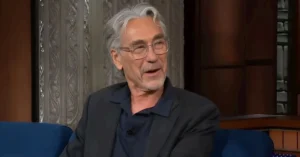Denis Villeneuve, the acclaimed director behind Dune and Dune: Part Two, has implemented a firm no-cell-phone rule on his film sets. This decision, rooted in his creative philosophy, is intended to foster focus, collaboration, and genuine presence during the filmmaking process. Villeneuve recently elaborated on his reasoning in an interview with the Los Angeles Times, shedding light on how technology can disrupt the delicate art of cinema.
Filmmaking as an Act of Presence
Villeneuve likens the process of filmmaking to other forms of art that demand full concentration. Comparing his craft to painting or dancing, he emphasized that undivided attention is essential for creative success. He explained, “Cinema is an act of presence. When a painter paints, he has to be absolutely focused on the color he’s putting on the canvas.” Similarly, he argued that filmmaking requires a team to work in unison, fully immersed in the moment.
“With a filmmaker, you have to do that with a crew, and everybody has to focus and be entirely in the present, listening to each other, being in relationship with each other,” Villeneuve stated. By banning phones, he ensures that cast and crew remain engaged and connected, preventing distractions that could hinder the collaborative process.
The Disruptive Nature of Technology
Villeneuve views the presence of cell phones as a major obstacle to the creative flow on set. He noted how even a brief moment of distraction, such as checking social media between takes, can derail focus and disrupt the atmosphere of collaboration. “When you say cut, you don’t want someone going to his phone to look at his Facebook account,” he remarked.
Beyond the filmmaking environment, Villeneuve also voiced broader concerns about the impact of technology on society. He described modern technology as addictive, likening it to a drug, and expressed worry over humanity’s increasing reliance on algorithms. According to him, this dependency fosters shallow thinking and weakens societal bonds.
A Philosophy in Action
Villeneuve’s no-cell-phone policy has been in place since his early days as a filmmaker. His commitment to this principle reflects his deep respect for the art of cinema and his desire to create an environment that nurtures creativity. The results speak for themselves: his Dune films, adaptations of Frank Herbert’s classic sci-fi novels, have been widely praised for their meticulous craftsmanship and immersive storytelling.
The first installment of Dune premiered in October 2021, introducing audiences to the rich world of Arrakis. The sequel, released in March 2024, expanded the narrative with new cast members, including Florence Pugh, Anya Taylor-Joy, and Austin Butler, alongside returning leads Timothée Chalamet and Zendaya. Both films are now available for streaming on Max.
For Villeneuve, maintaining focus on set is a cornerstone of his artistic vision, and his no-cell-phone rule is just one way he ensures his projects achieve their full potential. By prioritizing presence and collaboration, he continues to push the boundaries of cinematic storytelling.
For more updates on Denis Villeneuve and Dune, stay tuned to Vviptimes.




























